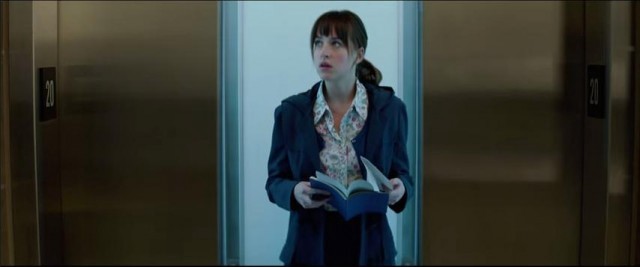How ‘Fifty Shades of Grey’ Does Money

I approached a worn copy of E.L. James’ Fifty Shades of Grey with the hopes that the book would be willing to give me an honest interview. I was nervous, so my first question came out a little awkwardly.
“You’re one of the best-selling books of all time, right?” I asked. It’s a terrible kind of interview question, one designed to corroborate what you — and your readers — already know.
“Actually, I am the best-selling book of all time,” Fifty Shades told me, its voice piping out of the covers in a way that was both overeager and presumptuous.
“Depending on your source,” I say quickly. I’ve done the research.
“All time is a very long time,” Fifty Shades continues. “Think of all that time stretching out, before us and behind us, with me in the center of it. Of all the books in the world, I am the one that the most people have chosen to hold, to take to bed with them, to caress and thumb the pages. And sometimes” — and here the book winks slightly, if books can be said to wink — “to throw me against the wall.”
“Okay, but that’s really unsafe,” I say. “Do you think you have a responsiblity for educating people on safe and consensual ways of exploring BDSM together?”
“I’m just a book,” Fifty Shades says. “A story. When do stories need to be responsible for anything but themselves?”
I change the subject. “So your movie’s opening this weekend, right?”
“It’s the fastest-selling film in movie history,” Fifty Shades says.
“Technically the fastest-selling R-rated title in Fandango history.”
Fifty Shades looks a little ruffled. “And Amazon is letting viewers see the film for free.”
“Well, Amazon is letting people receive Fandango Movie Cash that can only be used for Fifty Shades tickets, if people buy a series of select romantic DVDs. You can only get $7.50 in Movie Cash, which probably won’t be enough for the full ticket cost. And who still buys DVDs?”
“My readers,” Fifty Shades says. “My trillions of readers love DVDs.”
I don’t know which part of that comment to address first, and I’m starting to feel a little awkward about constantly correcting and instructing Fifty Shades. I don’t want to be the Christian Grey of interviews, after all. I switch over to an open-ended question, the one I often pull out when I don’t know what to ask:
“What else would you like Billfold readers to know about your finances?”
“Merchandising.” The word drips off Fifty Shades’ bookmark like an ice-cold white zinfandel. “The teddy bear with handcuffs. The Fifty Shades of Earl Grey tea. The Fifty Shades wine that my author E.L. James helped blend. The custom jewelry she helped create. There is so much merchandise that I can’t even think of it all.”
“Do you earn money from sales of each of these products? Can you reasonably predict your income every month?”
“I don’t keep track of my earnings,” the book says. “I have people to do that for me. And there is both official and fan-created merchandise out there, so I don’t earn money from everything.”
“Well, it was fan fiction that helped you get started,” I say, setting Fifty Shades up for another leading question. “So you’re happy that other fans are making money off your success?”
“Mmmmm…” the book says, a little indecisively. Then, switching to what feels like a prepared statement: “Fifty Shades is for everybody and we are happy that everybody is contributing to our sales and our story. In fact, hardware stores in Great Britain are preparing themselves to sell large volumes of rope, masking tape, and duck tape in association with our film launch.”
I can’t stop myself. “But that’s really unsafe. You can’t just use hardware store rope and duct tape. That’s not how BDSM works.”
“Ah,” Fifty Shades says, “but I’ve reinvented the genre.”
“What about the 50 Dollars Not 50 Shades campaign, which is asking users to forego seeing your movie this weekend and donate the money you would have spent to a women’s shelter?”
“I have no comment on that,” the book says, “except to say why not do both? You can indulge the senses while helping others.”
“I don’t think that’s the point,” I begin, but it’s clear that the book is uninterested in discussing anything further, and I am escorted out and away from its Seattle mansion and back to my tiny microapartment, where I too wonder if I could write a piece of fan fiction about an existing property and get — wait, what was it? — trillions of readers.
Support The Billfold
The Billfold continues to exist thanks to support from our readers. Help us continue to do our work by making a monthly pledge on Patreon or a one-time-only contribution through PayPal.
Comments